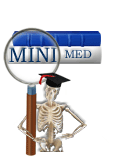
Tuesday evenings,
October 21- November 25, 2014
McIntyre Medical Building
3655 promenade Sir William Osler, 6th Floor
| DATE | TOPIC | SPEAKER |
|---|---|---|
| October 21 |
Epidemiology: Unraveling Medical Mysteries Learn how detective work uncovers the causes of diseases such as stomach ulcers, heart disease, cervical cancer. Discover how the tools of epidemiology have led to better health and longer lives and enjoy the first in a weekly series of Mini-Medical-Detective Challenges. |
Dr. James Hanley |
| October 28 |
Older Mothers, Fewer Babies, More Interventions: The Changing Landscape of Childbirth Couples increasingly decide to forego children or limit their families to a single child; many women now postpone child-bearing to their 30s or 40s; and obstetricians intervene to hasten delivery by labour induction or elective caesarean. This presentation will summarize recent trends in childbirth and their effects on the health of mothers and their offspring. |
Dr. Michael Kramer |
| November 4 |
Are Medications Safe? The Good, The Bad and The Ugly Despite extensive testing, many people die or are hospitalized from adverse reactions to medications. Using epidemiologic approaches, scientists can evaluate the risks and benefits of drugs used by the population. We will discuss examples of the usefulness of epidemiology in evaluating medications used for various illnesses and as well introduce the new Canadian Network for Observational Drug Effect Studies, which examines the safety of medications used by Canadians. |
Dr. Samy Suissa and Dr. Pierre Ernst |
| November 11 |
Epidemiology and Public Health: 1950 - 2014 This talk will present landmark studies in the history of modern public health and epidemiology, and illustrate how epidemiologists work and contribute to the identification and solution of public health issues. |
Dr. Jean-Francois Boivin |
| November 18 |
The Digital Revolution: Electronic Medical Records and Prescriptions E-health technologies are a fundamental requirement to effectively manage modern healthcare for an aging population with an increasing burden of chronic disease. It is time to transition from paper charts scattered throughout the health systems to electronic medical records and prescribing information accessible to patients and families and the care team. The change from the old ways to the new has begun. |
Dr. Robyn Tamblyn |
| November 25 |
Diagnostics at Work: From the Clinic to the Community Diagnosis is the first and critical step towards correct treatment. But diagnostic tests are not perfect – doctors and patients need to be aware of their limitations and strengths. We will review the scientific method for evaluating the accuracy of new tests, explore point-of-care testing, and see how modern technologies are bringing diagnostics into our homes. |
Dr. Nitika Pai and Dr. Madhukar Pai |
Lectures will be presented in English.
6:00 PM - Registration and refreshments
6:30 - 8:00 PM - Lecture
